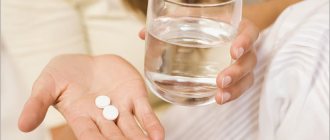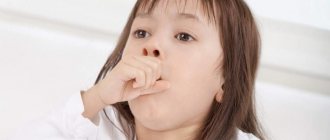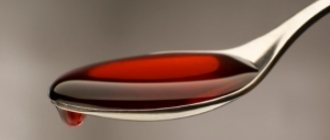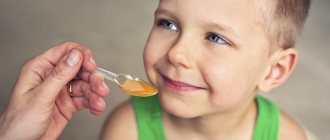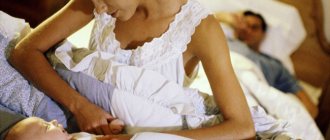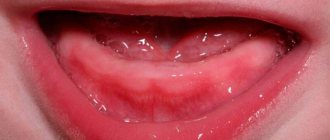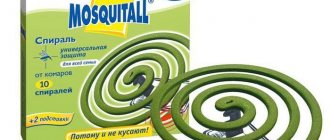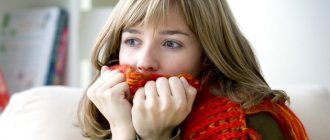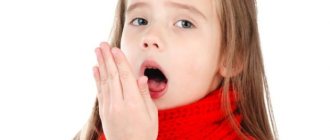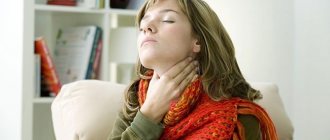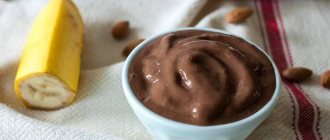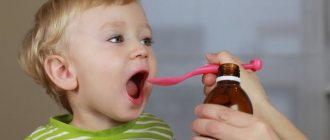Cough is considered a common symptom that characterizes a number of different diseases. It is common, and this can make it seem like anyone can cure it. Moreover, an experienced doctor will under no circumstances prescribe treatment for cough remotely without first listening to the patient, and especially to a child who has any disease with its own characteristics. It is not enough to treat the cough itself - it is necessary to eliminate the disease itself that causes this symptom.
Self-medication is especially dangerous when it comes to children. Children's bodies are structured differently, and their illnesses have their own specific characteristics. Most often, a child needs relief from a dry, strong cough, which is the most painful and unpleasant. It is more difficult to make a choice of medicine because not every medicine is suitable for treatment for children, especially for children in the first years of life.
Instructions for use of children's antitussive tablets
Tablets are a medicine and therefore must be prescribed by a pediatrician and used in accordance with the instructions.
There are different types of cough: dry, wet, gurgling, barking, hacking. As a rule, different types of cough are caused by different reasons, so different medications need to be selected. For example, there are special tablets for dry coughs for children and special ones for wet coughs. The tablets are packaged in glass vials or blisters, which are placed in cardboard boxes. Instructions for use are always located inside the paper packaging. Parents or caregivers should read it carefully and follow the instructions. This condition does not eliminate the need to coordinate the pill regimen with the treating pediatrician.
How do dry cough medications work?
A dry cough differs from a wet cough by its characteristic sound and the absence of mucus. It occurs at the level of the larynx and, as a rule, does not descend deeply. The symptom is accompanied by soreness and soreness, caused by irritation of the mucous membrane of the larynx. These unpleasant sensations provoke cough attacks, because the inflamed mucous membrane sends impulses along the nerve cells to the cough center located in the brain, in response it generates cough impulses.
Attacks of such cough often follow without interruption, which aggravates the course of the disease. Complications include breathing problems. The sound of a cough is dry, hacking, crackling, often similar to barking. Seizures disturb the child at any time of the day, which greatly exhausts him and does not allow him to regain strength even during sleep.
The cause of swelling and irritation of the larynx is the proliferation of viruses or bacteria on the surface of its mucous membrane. The appearance of a dry cough is characteristic of the first days of a cold (laryngitis, tracheitis, laryngotracheitis, bronchitis) and as a residual phenomenon of the disease.
In light of the above, antitussive drugs are used for the following purposes:
- blocking the cough center;
- effects on peripheral receptors, through which sensitive impulses from irritated mucous membranes are transmitted to the central nervous system (CNS);
Can children use cough suppressants?
Modern cough blockers are highly selective and act only on the cough center without depressing breathing. This quality distinguishes them from previous generation blockers based on narcotic substances, such as codeine, dionine or morphine. They do not form an addictive effect and dependence, do not inhibit gastrointestinal motility, causing constipation. Therefore, the answer to the question “can cough tablets that act as blockers at the central level be given to children” is more likely positive than negative. If the cough is not accompanied by the formation of sputum in the bronchi and lungs, then the blockers will not cause congestion in these organs.
For children, antitussives are prescribed in the form of syrups; the tablet form is suitable for school-age children.
What medications are allowed?
Tablets approved for children that affect the cough center include products containing butamirate citrate. These include tablets such as:
- Panatus (KRKA) - prescribed from 6 years of age daily, 20 mg tablet 2 times;
- Panatus forte (KRKA) - from 12 years old, 50 mg tablet daily 1 to 2 times;
- Omnitus (Serbia, Hemofarm) - children are prescribed a tablet form of 20 mg twice a day per tablet from 6 to 12 years and three times from 12 years.
More often, children are prescribed syrup and drops of Codelac Neo, Omnitus, Sinekod, Panatus.
Butamirate citrate is also part of a complex drug such as Stoptussin, in which it is combined with the substance guaifenesin, which thins mucus in the bronchi. For children over 12 years of age, it is prescribed to be swallowed after meals in a dose calculated by weight (up to 50 kg, half a tablet four times a day).
Important! Exceeding the dosage of cough blocker tablets may be accompanied by vomiting, nausea, stool upset, abdominal pain, dizziness, and loss of coordination. If these symptoms appear, you should take activated charcoal or rinse your stomach
Children's peripheral cough tablets are marketed under the trade name Libexin and contain prenoxdiazine. The substance relieves irritation of peripheral receptors due to a local analgesic effect, and also has a bronchodilator effect. The tablets slightly suppress respiratory class=”aligncenter” width=”800″ height=”600″|fcw3qayjh5a| src=”https://tbdoc.ru/wp-content/uploads/8/f/7/8f7adb89d13d15d00bedde8b0d4d385b.jpg” class=”aligncenter” width=”660″ height=”479″|fcw3qayjh5a| src=»https://tbdoc.ru/wp-content/uploads/f/7/6/f762bb219ed2a2130a9798bf5f6ed34a.jpg» class=»aligncenter» width=»600″ height=»359″|fcw3qayjh5a| src=”https://tbdoc.ru/wp-content/uploads/b/7/c/b7cc73b2316f9c99701bb5937221d933.jpeg” class=”aligncenter” width=”600″ height=”450″|fcw3qayjh5a| src=»https://tbdoc.ru/wp-content/uploads/9/e/e/9eeb14456393b027baae056f5fb1257e.jpg» class=»aligncenter» width=»600″ height=»800″|fcw3qayjh5a| src=»https://tbdoc.ru/wp-content/uploads/7/b/b/7bbd46867c851f4312f4d68bdecf7301.jpg» class=»aligncenter» width=»1708″ height=»712″|fcw3qayjh5a| src=”https://tbdoc.ru/wp-content/uploads/1/c/8/1c8dbfdc8c4a86d7fef878dae88daab1.jpeg” class=”aligncenter” width=”600″ height=”800″|fcw3qayjh5a| src=”https://tbdoc.ru/wp-content/uploads/3/c/2/3c265accae10048b34b1fdf4d8df3f8d.jpeg” class=”aligncenter” width=”600″ height=”800″|fcw3qayjh5a| src=”https://tbdoc.ru/wp-content/uploads/0/9/d/09d9322d8e91d83e76bd0c1b8f78433c.jpg” class=”aligncenter” width=”1024″ height=”768″|fcw3qayjh5a| src=»https://tbdoc.ru/wp-content/uploads/f/f/3/ff34855293009d96a3386dd7a1a25b0c.jpg» class=»aligncenter» width=»938″ height=»612″[/img]
Prescribed to children with caution. Age restrictions are not indicated in the instructions for the drug (Hungary, JSC "Hinoin")
The dose for a child depends on age and weight, is 1/4-1/2 tablets of 100 mg three times/four times a day.
Alternative medicine
The most effective traditional medicine recipes for treating dry cough in children
Traditional recipes are good for dry cough in children. Such effective means include:
- Radish syrup with honey. The radish is crushed and poured with honey. If the radish has formed juice, then the product is ready. They drink it one teaspoon up to six times a day.
- Milk with added butter, honey and soda. This remedy helps relieve sore throat and perfectly softens the mucous membrane.
- Plantain juice with honey. The products are taken in equal parts and cooked over low heat for twenty minutes. It is recommended to take three times a day, half an hour before eating. A single dose is one spoon (tablespoon).
- Onion based sugar syrup. Give the child half a spoon several times a day.
- Badger fat with milk and honey. Take 15 minutes before meals 3 times a day.
- Remedy made from unrefined oats. Cook in milk in the oven for about two hours. Then the broth needs to be infused a little. Give children something to drink throughout the day.
- You can give children decoctions of medicinal plants that have a coughing effect: coltsfoot, sage, thyme, marshmallow, nettle, ivy, peppermint, plantain, licorice root or thermopsis. You can make such a decoction from one herb or a collection of them.
Folk remedies are safer for treating children. Their only contraindications are considered to be individual intolerance and a tendency to allergic reactions. However, it must be remembered that such medications are considered auxiliary. Drugs for the treatment of dry cough should be prescribed by an experienced pediatrician. The use of folk remedies must also be coordinated with him.
Types of syrups by composition
These drugs are classified primarily according to their components, which have different origins. They are divided into the following categories:
- Based on synthetic components. Here the active substances are produced through the synthesis of various chemicals. These medications are aimed at quickly suppressing cough, and their components have an antispasmodic effect. They promote dilation of the bronchi, prevent bronchospasms and excessive accumulation of mucus in the lower respiratory tract.
- Plant-based syrups. The active substances are natural remedies, due to which such drugs have almost no side effects. Their action is not as fast as that of chemical drugs, but the therapeutic effect is much softer and longer lasting.
- Combination drugs. They consist of synthetic substances and natural components - extracts of medicinal herbs. Taken together, they have a mild and effective effect, quickly thin mucus, promote its evacuation, and relieve the symptoms of a dry cough.
Treatment for barking cough
Separately, it is worth describing the treatment of barking cough in a child. Symptoms of barking cough occur with swelling of the larynx. Most often it is dry. Treatment of barking cough is carried out according to the same strategy: first, mucolic drugs are given that dilute sputum, which, when the barking cough turns into a wet one, are replaced with expectorants. Herbal teas based on sage, chamomile, St. John's wort and mint help relieve a barking cough. It is necessary to temporarily exclude from the diet foods that can damage the mucous membranes of the larynx.
A barking cough is a serious reason to consult a doctor, especially if, along with its occurrence, the temperature rises, difficulty breathing and other dangerous symptoms occur.
Wet cough remedies
Productive cough medications are aimed at facilitating phlegm production. Expectorant tablets are used to thin mucus. Drugs are selected taking into account the disease and the intensity of symptoms. Some medications enhance the anti-inflammatory effect of drugs that are used in complex treatment. The following medications are prescribed for wet cough.
Children from 2 years old can use:
- ACC (more details in the article: powder, syrup and tablets “ACC” for children). The main substance is acetylcysteine. It promotes the removal of viscous sputum. The tablets dissolve in water, the daily dose depends on the age of the child.
- Thermopsol. Thanks to herbal components, it has an effective expectorant.
- Mucaltin (more details in the article: is it possible to take Mucaltin during gw?). Consists of medicinal herbs. Normalizes mucus production. The drug treatment regimen is prescribed by the doctor individually.
From 3 years old it is recommended:
- Rengalin. Absorbable tablets consist of antibodies to morphine, histamine, and bradykinin. A single dose is 1-2 tablets, the frequency and duration of use is determined depending on the causative agent of the disease.
- Bromhexine. It contains bromhexine hydrochloride, which effectively copes with thick sputum. Children under 6 years old are prescribed half a tablet 3 times a day, from 6 to 14 years old - a whole tablet.
From 6-7 years old the following drugs can be used:
- Lazolvan. The active substance is ambroxol. The product enhances the effect of anti-inflammatory and antibacterial drugs. It is taken 2-3 times a day for 5 days. The dosage is calculated depending on the age of the patient.
- Pectusin tablets are approved for children over 7 years of age. Consists of menthol and eucalyptus. Used as lozenges. Prescribed 1 tablet 3 times a day.
- Ascoril (more details in the article: instructions for using the drug “Ascoril” in tablets for children). Thanks to salbutamol, guaifenesin and bromhexine, the drug is used both in the absence of sputum and in its productive production. The duration of treatment with the drug is 7 days.
From the age of 12, it is allowed to take the drug Cough Tablets (with Thermopsis lanceolata herb). The medicine is inexpensive. It is produced in paper packaging of 10 pieces. The tablets effectively combat both types of cough. The duration of treatment is 3 days. Dosage for children – 1 tablet up to 3 times a day.
Traditional remedies
Pediatricians recommend creating the necessary conditions to relieve cough before starting medication treatment:
- the air in the room where the child spends time should be moist and cool. If it is not possible to moisturize it, you can use an inhaler;
- the child should often be outdoors in the fresh air if there are no obstacles to this, such as high temperature;
- Drinking plenty of fluids is recommended.
Traditional methods also have a good effect in the treatment of dry non-productive cough: mustard plasters, inhalations, warming ointments. They can quickly transform a dry cough into a wet one. It is especially worth noting inhalations, which show high effectiveness if performed correctly. Inhalations are carried out using various solutions, both medicines and herbs. Inhalations can be carried out either using special devices (inhalers, nebulizers) or the traditional method (through a kettle, covered with a towel over a bowl).
Medicines for inhalation are:
- "ACC injection";
- "Rotokan";
- "Tonsilgon N";
- "Fluimucil";
- "Sinupret" and others.
Their use as a solution for inhalation is described in the instructions for each drug. Properly performed inhalations are safe for children from the very first days of life, while these drugs themselves, when taken orally, may have contraindications for children up to a certain year of life.
What cough tablets are the most effective for children?
Dry cough tablets for children
• Stoptussin
The tablets have an antitussive and local anesthetic effect. They reduce the excitability of bronchial receptors and activate mucus production. The viscosity of mucus decreases, making it easier to clear. With simultaneous inhibition of the cough reflex, a mucolytic effect is provided.
They have many side effects (allergies, headaches). Not recommended for use by children under 12 years of age.
• Falimint
Dragee for resorption for non-productive cough. Antitussive, antiseptic, antiemetic drug. It has a local anesthetic effect, relieves irritation, and does not dry out the mucous membrane. Prescribed for children from 5 years of age. It is not recommended to give tablets for more than 3-4 days in a row. It should not be used if the patient has an allergic reaction into intolerance to one of the active ingredients. Patients suffering from diabetes mellitus should take into account that the tablets contain sucrose.
• Codelac
An antitussive drug that reduces the excitability of the cough center and facilitates expectoration of sputum. Does not cause respiratory depression. Tablets are prescribed to children over 6 years of age. Contraindications: hypersensitivity to the components of the drug.
• Sinecode
An effective remedy for the treatment of painful dry cough of various origins (bronchitis, tracheitis). Relieves inflammation, eliminates bronchospasm. The drug in the form of dragees is recommended for use in children over 6 years of age.
• Libexin
An anti-cough drug with peripheral action that reduces the sensitivity of receptors in the respiratory tract and dilates the bronchi. Libexin is used in the treatment of non-productive cough of various origins caused by chronic or acute bronchitis, emphysema and catarrh of the upper respiratory tract.
In childhood, it is prescribed with caution and taking into account the child’s body weight. Contraindications: excessive discharge of bronchial secretions, period after inhalation anesthesia, galactose intolerance
Use with caution in children.
Wet cough tablets
• Ambroxol
The tablets have a number of analogues with the same active ingredient (Lazolvan, Abrol, Ambrobene). Helps quickly cope with cough, enhance the effectiveness of anti-inflammatory and antibacterial drugs. Promotes the removal of sputum, treats chronic and acute bronchitis. Suitable for use from 6 years of age. Negative aspects: allergic reactions.
• Bromhexine
Bromhexine is a mucolytic (sputum-thinning) medicine that has an expectorant and weak antitussive effect. Tablets are taken for diseases that are accompanied by the appearance of viscous, difficult to remove sputum. Prescribed to children 6-10 years old. Bromhexine should not be prescribed if you are allergic to bromhexine or intolerant to other components.
• ACC
It is a mucolytic (sputum thinning) agent. Helps reduce mucus viscosity and has a direct antioxidant effect. Available in the form of effervescent tablets. Do not combine with paracetamol and other antitussives. Can be prescribed to children from 2 years of age. Should not be prescribed if you are hypersensitive to the active ingredient.
• Mukaltin
The drug has an expectorant, enveloping and anti-inflammatory effect. It is prescribed from the age of 3, while for young children it is crushed into powder and then mixed with water. In the treatment of wet productive cough, one of the most common drugs. Mucaltin enhances bronchial secretion and has an anti-inflammatory effect. Side effects: an allergic reaction is possible.
Negative aspects: contraindicated in diabetes mellitus, exacerbation of gastrointestinal diseases.
• Abrol
A remedy that is used for coughs and colds. Mucolytic agent for secretolytic therapy in acute and chronic bronchopulmonary diseases associated with impaired bronchial secretion and weakened mucus movement. Do not use in patients with known hypersensitivity to ambroxol hydrochloride or other components of the drug. Prescribed for children aged 6 years and older.
Before giving cough drops to children, be sure to consult your doctor.
Causes of dry cough in children
There are many factors that can cause a child to develop a cough.
When a child develops a painful dry cough, this indicates that the airways are not cleared of mucus on their own, which irritates the mucous membrane.
There are several causes of cough without sputum production. Often a dry cough is a sign of the following diseases:
- ARVI
- Pharyngitis
- Laryngitis
- Tonsillitis
- acute respiratory infections
- Tracheitis
- Bronchotracheitis
- Bronchitis
- Pneumonia
- Bronchial asthma
- Pleurisy
Pathogenic microorganisms and viruses provoke diseases of the lower and upper respiratory organs. Also, in children, a dry cough can accompany bacterial infections such as whooping cough, tuberculosis, diphtheria, and measles.
It is possible that a child may develop a cough due to an allergic reaction to plants, dust, or animal hair—lacrimation and runny nose are observed.
Sometimes the cause of a dry cough is gastroesophageal reflux. Then the cough reflex occurs some time after eating food. This phenomenon occurs especially often at night, when the child is in a lying position. This is explained by the fact that gastric juice penetrates into the oral cavity, which the child can accidentally inhale.
In very rare cases, a dry cough may indicate tumor processes in the respiratory organs, aortic aneurysm, and also heart defects. Often, a dry cough in children occurs as a result of foreign objects entering the respiratory tract, for example, small parts of a toy or a piece of food. A dry cough is considered physiological in children under one year of age when it occurs in the morning.
Signs of a pathological condition
To identify the cause of dry cough in children, you need to pay attention to additional symptoms
A dry cough differs from a wet cough in that sputum does not come out of the respiratory tract. Often this causes soreness in the throat, trachea, and bronchi as a result of irritation of the organ mucosa.
Signs of a dry cough are as follows: paroxysmal cough, similar to a dog barking, poor sleep, hyperemia of the larynx and its swelling, shortness of breath, difficulty breathing, poor health.
Homeopathic tablets and nasal drops for runny nose for children
Such a cough is painful, strong, it does not bring relief to the child, and also complicates normal life activities. If the cause is colds, then other signs of a pathological condition are possible:
- hyperthermia
- moodiness and irritability
- body aches
- lethargy of the child
- runny nose
- headache
- a sore throat
- swollen lymph nodes
Typically, a dry cough is observed in the first stages of a cold, then it gradually turns into a wet one. When a cough of allergic etiology occurs, lacrimation, bronchospasm, rhinitis, swelling and redness of the face, and rashes on the skin appear.
If your baby has frequent bouts of barking cough, then you need to seek help from a specialist who, after examination, will find out the cause of the pathology and prescribe appropriate therapy.
How to choose a drug by age
What syrup should I give to a baby with a dry cough, and which one is suitable for older children? Antitussive medications have age restrictions. This should be taken into account when choosing a medicine.
The following is a list of dry cough syrups for children in tabular form by age category.
| Dry cough syrups for children / age category | Drug name |
| Up to 1 year | Lazolvan, licorice root syrup, Bronchicum, Prospan, Herbion ivy, syrups with ambroxol. From 3 months - Bronchipret, from six months - Linkas |
| From 1 year | Alteika, Gelisal |
| From 2 years | Erispolom, ACC, Herbion |
| From 3 years. | Rengalin, Pertussin, Omnitus, Doctor MOM |
List of effective syrups for dry cough for children, available in domestic pharmacy chains:
| Name | Compound | Therapeutic effect | Application | Price |
| BRONCHOLITIN | Glaucine hydrobromide, ephedrine hydrochloride | Antitussive, bronchodilator | 1 teaspoon 3 rubles per day (from 3 years) | From 100 rub. |
| DOCTOR MOM | Elecampane, aloe, ginger, nightshade, cubeba pepper, wasaka, licorice | Bronchodilator, mucolytic, anti-inflammatory, mucokinetic | ½ tsp 3 r. per day (from 3 years). The therapeutic course lasts 14 days | From 175 rub. |
| KODELAK NEO | Butamirate citrate | Expectorant, eliminates unproductive paroxysmal cough, anti-inflammatory | 1 teaspoon 3 rubles per day (from 36 months) | From 139 rub. |
| GERBION primrose syrup | Plant herbs | Expectorant | ½ tsp 3 r. per day for 2-3 weeks (from 24 months) | From 230 rub. |
| SINECODE | Butamirate citrate | Bronchodilator, makes breathing easier | 3 r. per day for 7 days (from 3 years old) | From 260 rub. |
| GEDELIX | ivy leaves | Facilitating expectoration of sputum, anti-inflammatory, wound healing, antioxidant, antibacterial, antimicrobial, antispasmodic, mucolytic | ½ tsp 3 r. per day (up to 12 months). From a year - 1 teaspoon 4 rubles. in a day | From 350 rub. Good dry cough syrup for children |
| PROSPAN | ivy leaves | Mucolytic, expectorant, antimicrobial, antispasmodic, antitussive | 1 teaspoon 3 rubles per day (from 1 year). After consumption, side effects may occur in the form of skin rashes, since many children develop an allergy to ivy | From 400 rub. |
| EUCABALUS | Thyme and plantain, ethanol | Expectorant, mucolytic, anti-inflammatory | 1 tsp 2 r. per day (up to 1 year) | From 200 rub. |
| TUSSAMAG | Thymol and carvacrol | Expectorant, antiseptic | 1 teaspoon 2-3 r. per day (from a year) | From 239 rub. |
| TRAVISIL | Fennel, pepper, licorice, ginger, emblica, turmeric, terminalia | Local irritant, distracting, antiseptic, anti-inflammatory | 1 measuring spoon 3 rubles. per day (from 12 months) | From 96 rub. |
| LINCAS | Extracts of hyssop, marshmallow, violet | Emollient, bactericidal, antibacterial, expectorant, mucolytic | ½ tsp 3 r. per day (from 6 months). Course of therapy – from 7 to 10 days | From 135 rub. |
| BRONCHICUM | Thyme, alcohol | Expectorant, anti-inflammatory | 1 teaspoon 3 rubles per day (from 2 years). Duration of treatment is 2 weeks | From 199 rub. |
| PERTUSSIN | Thyme | Expectorant, mucolytic | 3 r. 1 measuring spoon per day, which comes with the kit (from 3 years old) | From 30 rub. This is the most inexpensive cough syrup for children |
| DOCTOR THEISS | Mint, plantain, beetroot | Improves the removal of mucus from the lungs and upper respiratory tract | ½ tsp 4 rubles per day, washing down the solution with water (from 1 year) | From 270 rub. |
| LAZOLVAN | Ambroxol | Mucolytic, expectorant | 2-3 r. in a day | From 190 rub. |
| Licorice root syrup | Herbal Ingredients | Expectorant, enveloping, antimicrobial, restorative | No more than 2-3 drops three times a day (from 1 year). From 2 years – from 2 to 10 drops three times a day. Before use, dilute the medicine in tbsp. l. boiled water at room temperature | From 50 rub. |
| ASKORIL EXPERTOR | Guaifenesin | Bronchodilator, mucolytic, expectorant | 1 teaspoon 3 rubles per day (up to 6 years) | From 228 rub. |
| AMBROBENE | Ambroxol | Mucolytic, expectorant | ½ teaspoon 2-3 r. per day 7 days (from 1 year). | From 104 rub. |
Medications for treatment
Effective drug treatment for cough in children can be prescribed by a doctor, depending on the cause.
There is a large selection of medications on the pharmaceutical market that are used in the treatment of dry cough.
For children over two years of age, cough suppressants can be used. They block the urge to cough by affecting the center of the brain. The following drugs are considered effective:
- Delsim
- Tusuprex
- Sinekod
- Robitussin
- Libexin
In addition, effective remedies for dry cough are medications that have an expectorant effect (remove mucus from the respiratory tract). They are usually prescribed if the sputum is difficult to separate. When treating dry cough in children under two years of age, the following plant-based syrups are suitable:
- Herbion (with plantain extract)
- Gedelix (ivy leaves)
- Doctor Mom (aloe, licorice root, basil, ginger extracts)
- Alteyka (with marshmallow content)
- Linkas (extract of medicinal plants for cough)
Useful video - How to treat a child’s cough:
Older children are prescribed stronger mucolytics. In these cases, drugs containing the active substance ambroxol are used:
- Ambrobene
- Lazolvan
- Ambroxol
The doctor may also prescribe Bronholitin, Bronchicum. Some drugs are combined, for example, Stoptussin, Codelac Fito, which has both an antitussive and expectorant effect.
Syrups are considered more effective, affordable and safe means for treating dry cough in childhood.
However, children from ten years of age can be prescribed mucolytics and antitussives in other forms of release. The usual medicine for dry cough helps children well. It is important to remember that the simultaneous use of antitussive and mucolytic drugs is prohibited.
How to treat laryngotracheitis in children: signs and treatment methods
Antibacterial therapy
Antibiotics are prescribed when the disease, a sign of which is a dry cough, is caused by pathogenic bacteria.
If there is a high temperature and increasing symptoms of the disease, the doctor may prescribe the following antibiotics to the child:
- Penicillin group: Amosin, Amoxicillin, Flemoxin, Ecobol, Augmentin, Ecoclave, Amoxiclav.
- Cephalosporin group: Cefriaxon, Suprax, Cephabol, Cefaclor.
- Macrolides: Sumamed, Erythromycin, Azithromycin, Rovamycin, Vilprafen.
Penicillins are most often used for treatment. However, if they are intolerant and other circumstances, a specialist may consider it advisable to use macrolides and cephalosporins. These drugs can be used to treat bacterial infections in childhood.
Parents should remember that they cannot select these products for their child on their own.
They are prescribed only by a specialist, taking into account the degree of the disease, age and individual characteristics of the child’s body. A prerequisite for antibacterial therapy is the use of probiotics - Linex, Laktovit, Bifidumbacterin and others. They help prevent dysbiosis in children.
Other effective remedies for dry cough
Inhalation with a nebulizer is also one of the best methods for treating dry cough in children.
There are also other methods of getting rid of dry cough that are effective and safe:
- Inhalations. Inhalations can be done over steam in a saucepan, but for children it is better to perform the procedure using a special device - a nebulizer. For this method, decoctions of calendula, coltsfoot, chamomile, licorice, and elecampane are suitable for treating dry cough. Potato broth is often used. You can do inhalations with the addition of aromatic oils - eucalyptus, pine, mint. It is important to remember that after the procedure it is not recommended to go out into the fresh air - this can only aggravate the situation. It is advisable to do inhalations several times a day, and then persuade the child to lie in bed.
- Rubbing. A good remedy for rubbing is badger fat. It should be rubbed into the child's back.
- Compresses. Mustard plasters are used for compresses. You can also make cakes based on honey, flour and corn oil, crushed potatoes. They are done before going to bed.
Green snot in a child: causes and best treatment methods
These procedures can only be carried out if the child does not have a fever.
Medicines depending on the nature of the symptoms
Medicines should be selected depending on the nature of the clinical picture. This applies to cheap and expensive tablets.
Dry cough
This type of cough, caused by exacerbation of chronic pathologies of the respiratory system, is treated with medications that have a local (most preferable) or systemic effect. The first group (Libexin, Prenoxdiazine) prevents bronchospasm, and the second (Bromhexine, Solvin) is prescribed for acute pathologies. If the phenomenon in question does not stop, narcotic drugs are used (Terkodin, Codelac). At the initial stage of development of a cold, mucolytic medications are recommended.
Wet cough
If the patient coughs up mucus, then it is necessary to use:
- Mucolytic tablets - "ACC", "Fluimucil".
- Combined medications that have a mucolytic and expectorant effect - “Ascoril”, “Bromhexine”, “Ambroxol”.
If a sufficient amount of sputum is produced when coughing, expectorant medications are recommended:
- "Dr. MOM." The drug is based on herbal components that suppress the inflammatory process and soften the throat tissue.
- "Mukaltin." The drug is based on marshmallow extract, which stimulates the contractile function of the bronchi and the functioning of the glands.
- "Thermopsis". This Soviet drug enhances sputum secretion due to the combined action of the Tremopsis plant and sodium bicarbonate.
Some expectorant tablets cause unpleasant consequences in the form of intestinal upset.
Allergic reaction
The symptom occurs in the form of a reflex reaction of the body to the action of the pathogen. To relieve allergy symptoms, cadeine-based medications are prescribed:
- "Quintalgin";
- "Codelac";
- "Terkodin";
- "Tedeen."
Local antitussives can be an analogue of these medications. If you have an allergic reaction, you must take an antihistamine.
Treatment methods for bronchitis
For chronic bronchitis, topical antitussive drugs or mucolytic agents are prescribed. In case of exacerbation of the pathology, the latter must be supplemented with expectorants. You should take medications until the disturbing symptom disappears.
